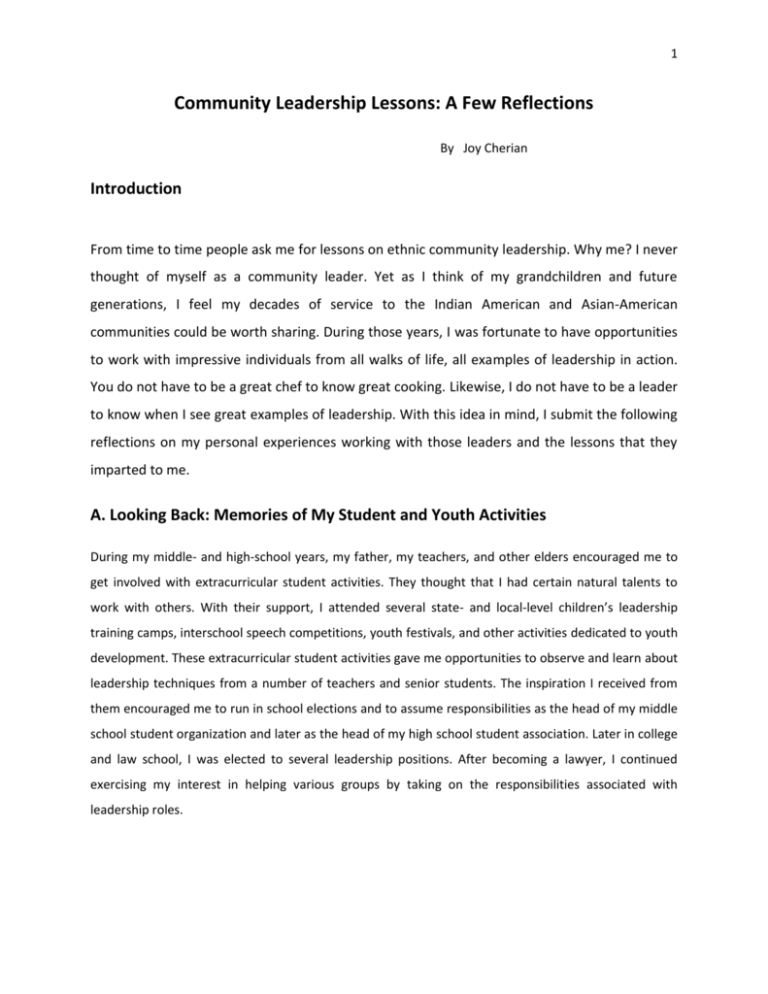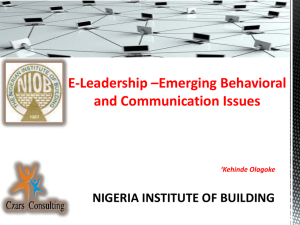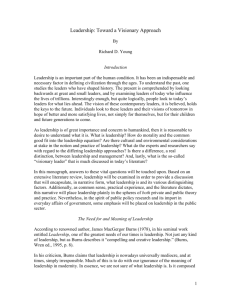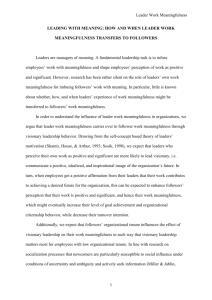
1
Community Leadership Lessons: A Few Reflections
By Joy Cherian
Introduction
From time to time people ask me for lessons on ethnic community leadership. Why me? I never
thought of myself as a community leader. Yet as I think of my grandchildren and future
generations, I feel my decades of service to the Indian American and Asian-American
communities could be worth sharing. During those years, I was fortunate to have opportunities
to work with impressive individuals from all walks of life, all examples of leadership in action.
You do not have to be a great chef to know great cooking. Likewise, I do not have to be a leader
to know when I see great examples of leadership. With this idea in mind, I submit the following
reflections on my personal experiences working with those leaders and the lessons that they
imparted to me.
A. Looking Back: Memories of My Student and Youth Activities
During my middle- and high-school years, my father, my teachers, and other elders encouraged me to
get involved with extracurricular student activities. They thought that I had certain natural talents to
work with others. With their support, I attended several state- and local-level children’s leadership
training camps, interschool speech competitions, youth festivals, and other activities dedicated to youth
development. These extracurricular student activities gave me opportunities to observe and learn about
leadership techniques from a number of teachers and senior students. The inspiration I received from
them encouraged me to run in school elections and to assume responsibilities as the head of my middle
school student organization and later as the head of my high school student association. Later in college
and law school, I was elected to several leadership positions. After becoming a lawyer, I continued
exercising my interest in helping various groups by taking on the responsibilities associated with
leadership roles.
2
After coming to the United States in 1967, I struggled to make my way as a graduate student. While
coping with graduate student life, I volunteered to work with student groups on campus and with an
inter-university student body, the Foreign Student Service Council.
One day I heard a remark made by a speaker in a leadership seminar in Washington, DC. He stated,
“Leaders are born, not made.” I was surprised and disagreed with that statement because my
observations had taught me a different view. I have come across many leaders who did not have
leadership in their family background but who have produced significant impact-making results in
community activities. On another occasion I heard a youth conference speaker say, “Many people have
dormant leadership skills and those skills can blossom when appropriate circumstances become
available.”
In the past a few leaders inspired me with their talents in building coalitions of like-minded groups for
achieving common goals for the benefit of all members of their communities. In the mid-1980s, several
Asian American association leaders formed a coalition of diverse ethnic groups. They established and
maintained long-lasting social contacts and built political connections for the benefit of their members. I
often look back with admiration at the initiatives of those leaders who became involved in civic
engagement and sacrificed their own personal interests for larger benefits for their community groups. I
am proud to salute them for their visionary leadership with unity and dedication. In fact, in later stages,
their initiatives conferred benefits upon individuals like me.
B. Admirable Leadership Qualities
When I think about the past activities and service of a number of community leaders, I can readily
identify some of the unique leadership qualities and talents they exhibited. Let me list some of those
admirable qualities of leadership. Certainly this list may not be complete. I encourage readers of this
paper to bring to light other leadership qualities that are not mentioned in this paper.
1. Dedication with Determination
A leader of any group or association should move with a dedicated mind to achieve the goal of the
community organization. In this process, he or she should have the determination to stay on the same
track without diverting his or her attention in any other direction. The individual who has assumed the
responsibilities of chairman, president, secretary, or any other responsible position of an association
should devote his or her efforts wholeheartedly to achieving the mission and objectives of the group.
3
2. Followership Experience
If you look closely at the life stories of successful leaders, you will find an interesting common factor. All
of them were good followers of their elders, teachers, or leaders. Lessons learned as loyal followers
helped them to understand and identify needs of their colleagues. A loyal follower does not put down
his own organization’s leaders to gain title or position. At the appropriate moment, fellow followers will
give opportunities to a hard-working colleague who has the potential to lead the organization. And
typically the experiences of those leaders as followers have guided them in the proper directions.
3. Goals for Success
Generally speaking, every organization has a set of aspirations. The leader of an organization should
design appropriate programs in consultation with fellow executives to achieve realizable goals in
furtherance of those aspirations. Organizational programming should be applied to a set of wellthought-out goals. Without fixed goals, an organization can float like an uncontrolled kite.
4. Impeccable and Inspiring Integrity
Integrity is a necessary quality for an effective leader. The leader with class and character can be
counted on to adhere to a well-laid code of principles, including accountability. These principles
generally are acceptable to all members of the organization and to the society around them. Further,
this model leader resists any possible corrupt practice in the organization and upholds good values
based on honesty and humility. Virtues such as honesty and humility make a leader a trustworthy
individual. Even opponents or detractors of the trustworthy leader can be compelled to hold at least
grudging admiration for him or her.
5. Passion with Patience
A leader should have spontaneous passion in carrying out the mission of the organization. We have
witnessed people who would do anything to become a president or the head of a popular group. The
only goal of this individual is to get community recognition or personal gain as through publicity in the
ethnic newspapers. After receiving the title, this individual holds the position without accomplishing
anything for the association. One of the reasons for this is that the so-called “leader” did not have a
passionate commitment to do the job. I would advise this leader to step down from the position and
help to elect an individual who has shown leadership abilities and a desire to achieve the organization’s
goals.
4
A leader with the passion to lead his or her organization should also posses the quality of patience. His
or her behavior should model self-control. A long time back I learned a mnemonic, “patience prevents
possible problems.” In a leadership role, a self-controlled mind is always an asset that draws respect
from followers.
6. Persistence with Perseverance
An individual in a leadership position can successfully overcome any difficult situation if he or she is
persistent in his or her efforts. The leader should proceed toward the organization’s goals with an
attitude of reasonable stubbornness. The persistent leader should also exhibit perseverance by
continuing already undertaken activities in spite of hurdles or difficulties on the way to reaching a
defined goal.
7. Pragmatic Approach
A leader who works very hard to undertake any venture should adopt a pragmatic approach in
performing the leadership responsibilities. In other words, the leader should not undertake to achieve
illusionary goals. A pragmatic leader always moves with a practical plan that shows a distinct way to
reach the ultimate goals of the organization in an admirable manner. He or she should consult with
individuals who have practical knowledge of how to face complicated situations and find solutions
effectively.
8. Public Relations
An interest in interacting with all organization members and workers, associated interest groups, and
the general public and in developing good relations with everybody is a must quality for any leader who
wants to be successful in a community leadership position. An individual who doesn’t have an interest in
mixing and mingling with fellow association members will likely be a failure in a community leadership
position. A genuine leader reaches out and touches the mind and souls of all members of the group. A
basic inclination toward reaching out can identify an individual with potential public relations talents
that could propel him or her to success in interacting with internal members of the organization as well
as members of the general public. It is also very important to develop good relations with external
communication contacts to educate the general public about the activities of the organization. No
leader should seek publicity with a selfish motive.
5
An effective leader will always find new ways and methods to establish and develop access to individuals
in public service groups and government agencies. These contacts with influential persons in powerful
positions are valuable assets for any community organization.
9. Service-Oriented Mind
A service-oriented mind is absolutely necessary for an office-bearer to confer benefits upon the
organization and its members. A look into past services of any prominent community leader who has
made admirable contributions to the general public will always show this one analytical result: the
individual must have possessed a generous service-oriented mind.
From time to time we come across individuals who have succeeded financially in their professions or
businesses. They want to occupy chairs of popular community organizations. One of the major goals of
these rich individuals may be to acquire personal prominence for themselves. Some of them merely
want to hold titles and positions in order to grab photo opportunities with VIPs, gain recognition, or
receive awards. Such individuals are typically eager to receive publicity in the media. These kinds of
leaders who have money but not dedicated service-oriented minds often fail miserably in their
responsibilities to lead and guide their community organizations. Ultimately organizations that allow this
kind of person to occupy major leadership positions become weak and fade away. Therefore it is a must
that members of community groups select or elect service-oriented individuals to leadership positions in
their organizations.
10. Striving for Excellence
A model leader always focuses his or her initiatives and activities so as to produce excellent results for
the benefit of the organization. In other words, this leader would always move with relentless pursuit
for excellence. This model office-bearer builds a development platform and shares it with his or her
fellow office-bearers. The true leader builds on his or her successes and works around the failures and
misdeeds of other leaders or would-be leaders. Attempting to bring down competitors or detractors to
climb to a higher position should be rigorously avoided.
11. Team-Building
Another admirable quality of an organization leader is the ability to build a unified team. A leader of any
group should develop a plan to bring his or her followers to a common platform. How does one
accomplish this? We must learn from the strategies applied and deeds performed in the past by our
6
successful leaders. Typically, they didn’t claim credit for themselves for the successes of organizations
under their leadership. They shared honors with their followers and fellow office-bearers, recognizing
loyal and generous support. A good team-builder must have sensitivity and compassion and take
initiative to follow up on essential needs and fair demands of their followers.
A successful leader must have one voice that represents the entire group. This unified position not only
grants empowerment to followers but also builds a strong united team. Ultimately, this united team
achieves top results for the benefit of the entire organization. This point can be articulated with a true
story. During the mid-1980s, President Ronald Reagan’s White House staff members noticed a particular
sort of teamwork in a national Asian American organization. The White House staff observed the teambuilding strategies of their national president. In addition, US Congressional leaders also watched with
interest the activities of this individual in the leadership position and of his colleagues who sincerely
worked with him. Eventually this Asian American group president was nominated to a sub-cabinet-level
national presidential commission by President Reagan. Later, the US Senators unanimously confirmed
him to the commission. I have heard that the White House was impressed with this Asian American’s
unifying activities, including giving appropriate prominence and importance to the colleagues and
followers who stood behind him.
12. Visionary Trait
A unique characteristic of an admirable leader is a visionary trait. This leader always looks forward to his
or her involvement with future activities with an imaginative but pragmatic approach informed by past
and present experiences. It is not necessary that all leaders should be true visionaries. As you know,
there are two kinds of leaders: (1) movement makers and (2) project managers. Movement makers are
generally visionaries who typically think twice before undertaking any very important initiative. They
motivate, inspire, guide, and lead their followers to achieve their goals. Project managers may not
necessarily have visionary traits like movement-making leaders. They excel under guidance or direction
from others. Movement makers typically seek the benefit of solitude for better thinking. As a result,
they reach appropriate findings to implement their plans efficiently. Thus this type of leader is identified
as “visionary.” At this point, I would like to identify a few great visionary leaders who have shown the
world unique and admirable leadership. Sri Buddha taught his followers about the value of solitude
through meditation. Even Alexander the Great sought the advice of a great Greek philosopher,
Diogenes, who was a famous teacher of solitude. Mahatma Gandhi practiced admirable solitude through
meditation. Abraham Lincoln preferred solitude before his plan implementation. Mother Teresa,
7
founder of the Missionaries of Charity, always prayed silently before she undertook any new project. All
those individuals were great visionary leaders. Their wonderful experiences are inspiring lessons for our
emerging youth leaders.
Concluding Remarks: Looking Forward
I urgently request our present community leaders to review carefully the points concerning leadership
qualities identified in this paper. They should also take initiatives to establish youth leadership training
seminars for our emerging community leaders. These seminars should include high school and college
students who have exhibited leadership skills. This is in no way a new idea. In the past, immigrant
communities who migrated from other countries to the United States learned to do this when they
faced hardships. When they struggled to be part of the mainstream in America, they were neglected and
discriminated against. The wealth they acquired through hard work alone did not give them equal rights
and fair opportunities in the United States. They badly needed visionary leaders to guide and lead them
to desirable and appropriate life opportunities. Therefore they groomed individuals with admirable
leadership skills to represent them before mainstream power centers. Finally, those ethnic communities
with their new leaders moved into the American mainstream. Eventually each of those communities
made an indelible impact in every walk of American life, including the political realm. For this reason,
every individual who wants to help his or her community to move forward should encourage emerging
leaders to learn admirable lessons of yesterday and today for the community’s benefit in the future.
©Copyright 2012 by Joy Cherian, Ph.D., Maryland, USA. All rights are reserved.
*****











